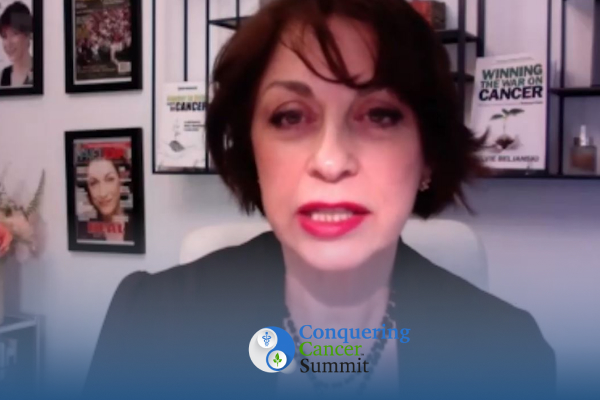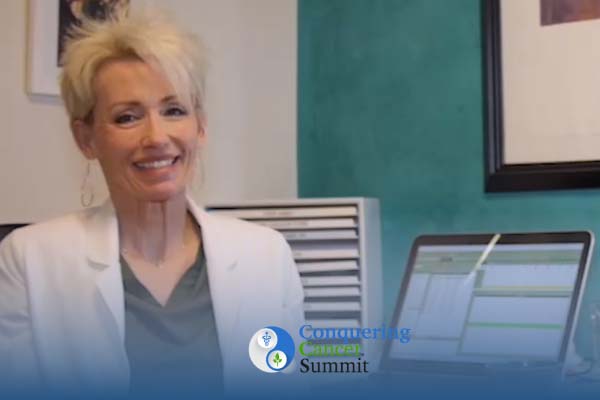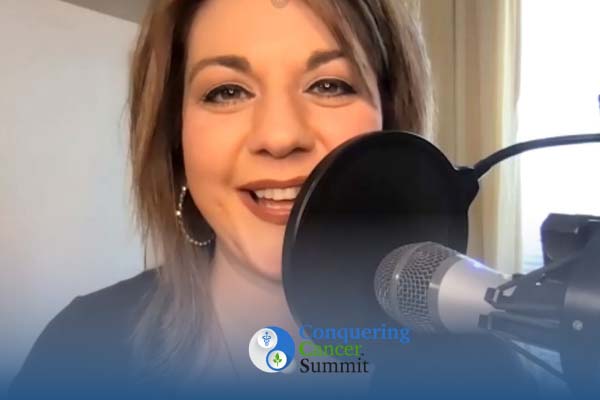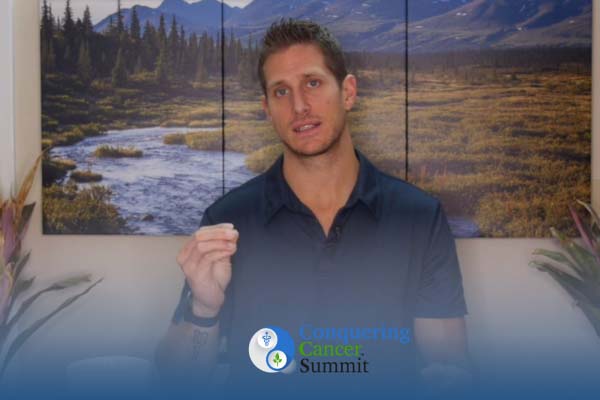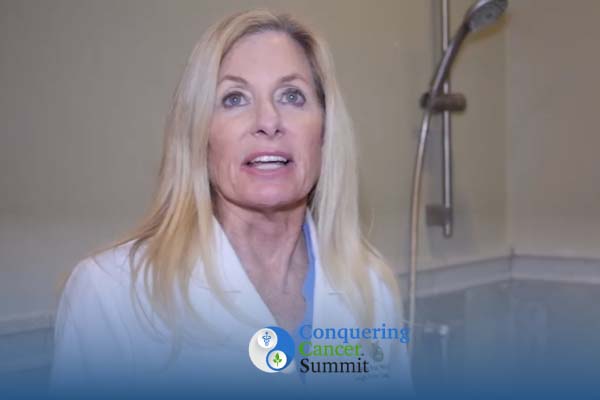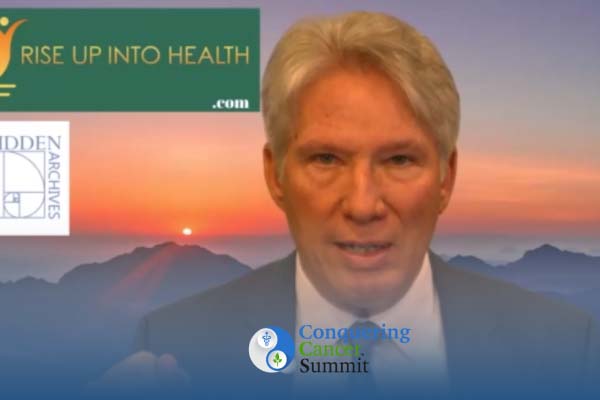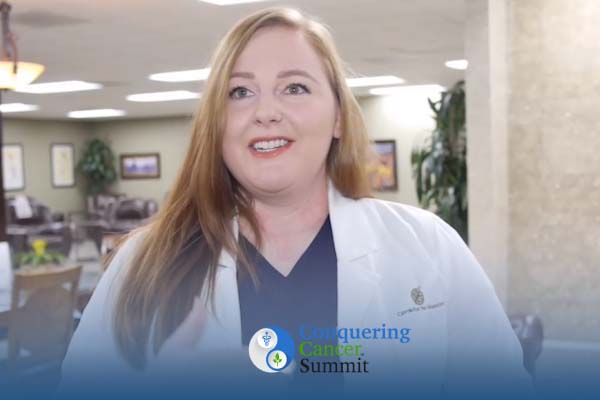Join the discussion below
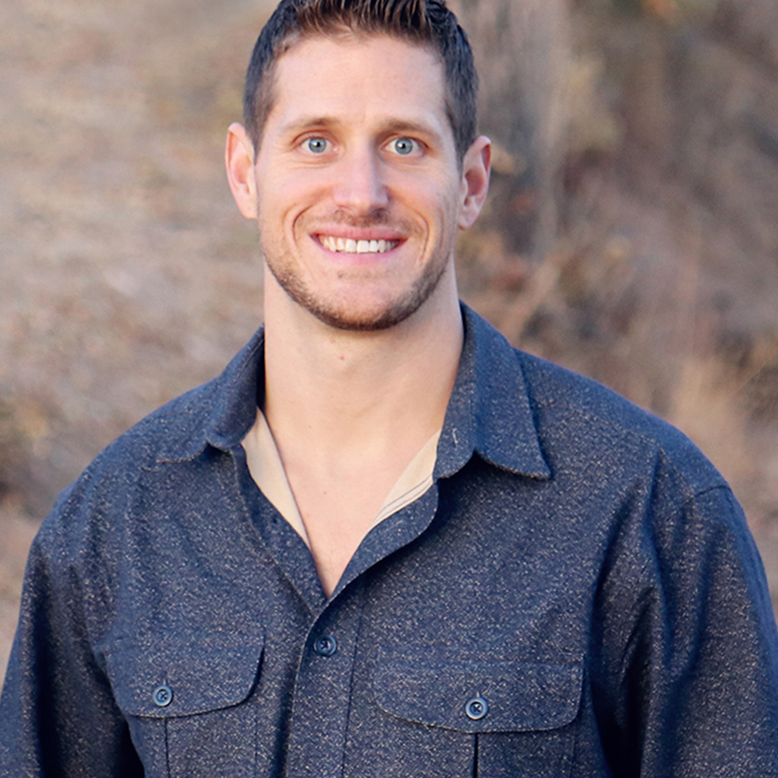
Nathan Crane is an award-winning author, inspirational speaker, plant-based athlete, event producer and 18x award-winning documentary filmmaker. Nathan is the Founder of The Panacea Community, Creator of the Global Cancer Symposium, and Director and Producer of the documentary film, Cancer; The Integrative Perspective. He is also the Director of Strategic... Read More
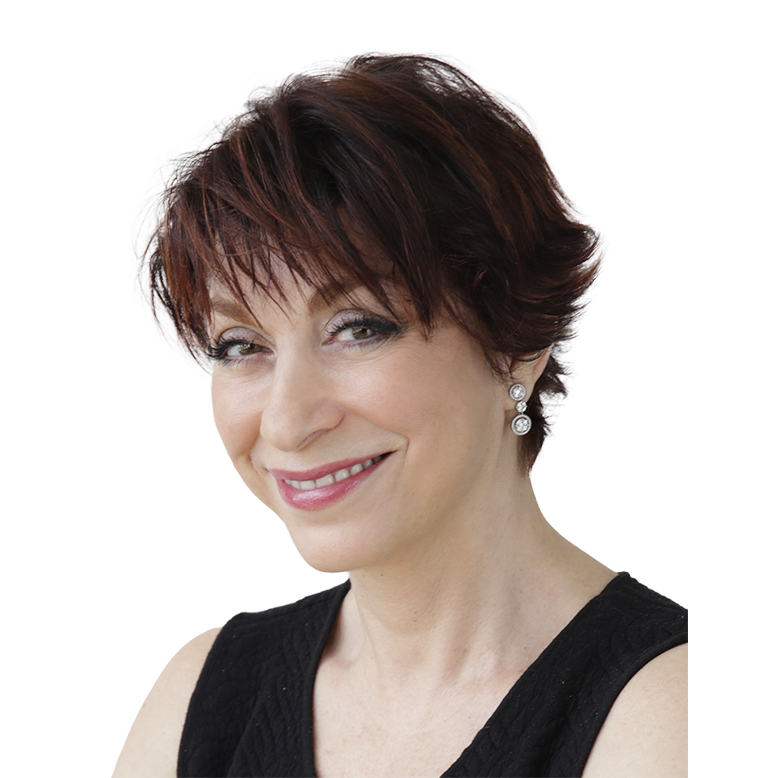
Sylvie Beljanski, a French lawyer by trade, is a health advocate for holistic medicine, public speaker, internationally known author and entrepreneur. She is the Vice President of The Beljanski Foundation, whose mission is to research natural approaches to cancer. She is also the CEO of Maison Beljanski, an international dietary... Read More
Cutting edge science finding natural solutions for cancer.
The shocking history of Sylvie Beljanki’s was called the Father of Environmental Medicine.
Why Mirko Beljanski’s entire research trying to find natural cures for cancer were destroyed.
The incredible research proving the effectiveness of natural compounds for cancer.
A product made from extracts of the Brazilian paopereira tree that are proven to help against cancer.
Related Topics
Aids, Antiviral Activity, Arrest, Beljanski Foundation, Cancer, Cancer Cells, Chemotherapy, Clinical Trial, Condemnation, Dna Destabilization, Environmental Toxins, European Court Of Human Rights, Francois Mitterrand, French Government, French Government Dismissal, Healthy Cells, Hiv, House Arrest, Hydrotherapy, Immunity, Laboratory Destruction, Legal Defense, Leukemia, Molecular Biology, Natural Compounds, Natural Cures, Peer-reviewed Articles, Pioneer, Prison, Prostate Cancer, Roadblocks, Scientific Research, Side Effects, ToxicityNathan Crane
Hey, it’s Nathan Crane, director of the Health and Healing Club and host of the Conquering Cancer Summit, and today I am honored and excited to welcome you to a very special interview. Sylvie Beljanski is a French lawyer by trade, a Health Advocate for holistic medicine, a public speaker, and an internationally known author and entrepreneur. She’s the Vice President of the Beljanski Foundation whose mission is to research natural approaches to cancer. She’s also the CEO of Maison Beljanski and International Dietary Supplement Company, and Ms. Beljanski is the award-winning author of “Winning the War on Cancer: the Epic Journey towards a Natural Cure.” Sylvie, thanks so much for joining us.
Sylvie Beljanski
Thank you for having me, I’m delighted to be with you today, Nathan.
Nathan Crane
It’s an honor to have you here, and your family history is really fascinating, right? And what kind of led you to start the Beljanski Foundation and led you to doing the work you’re doing now, really around finding natural solutions and even doing heavy scientific research, searching for natural cures for cancer. So let’s start there, can you talk a little bit about your own family history, your father’s history, and what made you start the Beljanski Foundation?
Sylvie Beljanski
Sure, absolutely. Well, indeed I am not a scientist by trade. I went to law school, I was not specifically interested in science, but my father, and I would say my mother’s family, have been in science for three generations, and I grew up saying, “No, no, no, no, I don’t want to get involved.” And when I was growing up, my parents did not feel very happy, and I did not really understand why is it they don’t look happy? My father was a PhD at Besta Institute, He invested in biochemistry, PhD in biochemistry. My mother was working with him at Besta Institute, but as a little girl, I did not really understand why there was such a heavy cloud upon our family. It is only later on that I understood that my father was one of the first scientist to be involved in understanding how environmental toxins affect our DNA and eventually destabilize cumulatively, progressively, our DNA, and the destabilized DNA is a hallmark of cancer sites.
So basically, by showing and being able to measure how environmental toxins actually destabilize our DNA, and measuring the rate of destabilization of that, the rate of the synthesis of cancer cells. He has been, kinds, a father of environmental medicine, and it’s always difficult to be a pioneer, but there were so many, so much money involved in blocking what has become environmental medicine, that he made a lot of enemies along the way because polluters don’t want to pay for the consequences. Now, everybody knows that environmental toxins are bad for you, bad for your health, but back in the 60s, it was brand new, and pioneers were not accept, those kind of ideas were revolutionary are not welcome.
But my father persisted, and now, he’s in the 80s, and in 80s, he came up with those natural compounds which are able to do the exact opposite of environmental toxins, meaning natural compounds able to recognize cancerous cells, destabilize DNA, wherever it is located, because we have one DNA, and is able to prevent the duplication of cancerous cells wherever they are located. And because it is really specific to cancerous DNA, its not going to touch healthy DNA wherever you have a healthy cells. So it means, now we are speaking of compounds which are specific of cancerous cells and are not going to touch healthy cells, meaning no side effects, no toxicity. So he published, he published, he published, and it got the interest of a lot of doctors, of course at the time, french doctors, who were really interested in having one compound that would work for all cancer patients without toxicity, no side effects, and even better was working very well together with chemotherapies and hydrotherapies. And then we are now in the 90s, and the former French president of the Republic, Francois Mitterrand, got diagnosed with advanced prostate cancer. He already had cancer for a very long time from his first term in office, but it was kind of kept secret at the time, there was no internet in 1990s.
But eventually, the president had to have a surgery, the surgeon said that the cancer has spread everywhere and the president would not finish his second term, which were seven years at a time in France. But Mitterrand had a mistress who had knew about a good family doctor who had a lot of success with my father’s products, and that’s how Mitterrand started to take the Beljanski products, and as we know, he was able to finish his second term against all odds. A few months after Mitterrand finally passed away, they sent, the french government sent the army, the French army, the SWAT team, to destroy the laboratory, to destroy the research completely, this is everything. Without a police warrant, everything was gone, the extracts, the research, the all the documents in the lab, everything.
Nathan Crane
Did they, when they came and stormed your father’s lab, did they just take everything away? Did they burn it down? What happened?
Sylvie Beljanski
No, they did not burn down the laboratory, they did not burn down the building but they arrest, they came with six moving trucks to remove everything.
Nathan Crane
Wow.
Sylvie Beljanski
And they arrested my father, they arrested my mother, they arrested everybody who were working at the laboratory, the maids, everybody, everybody was arrested.
Nathan Crane
What was their pretense for arresting your father?
Sylvie Beljanski
And they had a laundry list of stuff.
Nathan Crane
A laundry list of charges?
Sylvie Beljanski
Yes.
Nathan Crane
Wow.
Sylvie Beljanski
And I was a lawyer working at the time in New York, in a law firm and it was a time difference. I was calling my family from time to time, and I called and it was ringing, ringing, ringing, nobody was answering, finally, I got to call my mother who said, “Why is the lab not answering?” And that’s how I learned that all of them had been arrested. And as a lawyer, my first thing was, “Okay I’m going to take care of the legal defense.” That was my first hook, and when I started to get involved into the case, then I understood that why destroying everything? That’s something not normal here, why is the due process not respected? Why are they trying to destroy everything and what are they hiding? What is it they don’t want people to see? And that’s where I started digging, digging, digging, and I started to really understand the magnitude of my father’s work, and that it was really disturbing to a number of people in power that some natural compounds could do better than synthetic ones.
Nathan Crane
Now, before we continue with that, from what I understand, at least the little research I’ve done on your father, was that up until that point, he was a well-respected scientist in the scientific community. He had published somewhere around 133, is the number I found, 133 scientific articles.
Sylvie Beljanski
Yes.
Nathan Crane
I don’t know how many peer-reviewed, but many of them peer-reviewed-
Sylvie Beljanski
All of them, all of them.
Nathan Crane
All of them peer-reviewed scientific articles published.
Sylvie Beljanski
Yes.
Nathan Crane
Well published research in the scientific field on molecular biology. And not only was he searching for cures for cancer, but also for AIDS, right?
Sylvie Beljanski
Absolutely, in the 80s when AIDS came and there was no cure, official treatment, it turns out that he discovered that one of his natural products had also antiviral activity, they researched that on different kinds of viruses, including AIDS, and he was able, at the time, to have a clinical trial done in a French hospital for people, HIV positive, and it worked very well, this population was followed for one full year and the immunity improved during the year when they were taking nothing else.
But again, that was completely dismissed, completely dismissed, so French government had no interest into finding anything natural that worked. I think there is kind of a desire, political approach, where they see everything natural that works as a threat, and therefore it has to be destroyed or silenced in one way or another.
Nathan Crane
So your father was put in prison?
Sylvie Beljanski
Well, he was, yes, but put into very shortly, and then he was put in house of arrest and he had to stay at home. That was very, very strange that this man who was very healthy until the day of his arrest, they told him the day of his arrest too, they did not follow the due process, they did not take him to see the judge right away. They sprayed the laboratory because there were concerns about plutonium, some things that don’t really make sense, and they ordered him to stay in the sprayed laboratory all night, and when I had access to the legal case, there was nothing about the spraying with something. And two months later, he started to develop leukemia, acute leukemia, which is something you don’t recover from when you are 74.
Nathan Crane
And he had no history or evidence of having leukemia before this point?
Sylvie Beljanski
No he was strong and healthy to the day before this arose at the laboratory.
Nathan Crane
Wow, what a shocking story, and what a sad experience for you and your family to go through.
Sylvie Beljanski
Indeed.
Nathan Crane
And so, you were an attorney at the time, and you were trying to legally defend him.
Sylvie Beljanski
Yes, I got
Nathan Crane
And what did you discover? What kind of roadblocks did you come against and what hope did you have from that experience?
Sylvie Beljanski
So, first thing is that, when I try to defend him in front of the French judge, of a French quarter, they did not give us a day in court.
Nathan Crane
Hmm.
Sylvie Beljanski
So at some point, my father said, “Well, we have to do something, what is beyond the French court?” And I said to the European court of human rights. So we went before the European Court of Human Rights, my father died during the process, but we won, a unanimous decision, Beljanski against France, the French government was at the condemnation for not respecting violation of human rights.
Nathan Crane
So you went in front of the European Court of Human Rights and you won that case against the French government?
Sylvie Beljanski
Yes.
Nathan Crane
So what did that mean? Did they give you all the research back or that research was gone forever?
Sylvie Beljanski
They gave my mom a little bit of money, one must not think it was more an emotional closure, I would say than a, than anything else, but that gave me the resolve to say the outcome is ridiculous, actually, this little bit of money means nothing. What would really be meaningful would be to carry on with the research and prove my father as scientifically right, and that’s how I started with Beljanski Foundation, at the beginning, that was my idea to prove him right. As we were able to work with reputable academic institutions like Columbia University, Kansas University Medical Center, we have been working also with Nanjing University, we had a clinical trial at Cancer Treatment Centers of America, we had a number of scientific publications, again, peer-reviewed in good papers, that came in.
And beyond my objective changed obviously there, it was no longer about my father and about proving him right in some way, I felt that was done, but I got really in, I fell in love with this research, I felt in love with the possibilities that those natural compounds without toxicity, without side effects can offer, and the amount of research on beautiful papers of possibilities that this research is uncovering. So a number of people now that have been helped saying thank you, that’s what I’m living for now.
Nathan Crane
Yeah, that’s beautiful, what an incredible story for you to take your father’s research, for you to take this drastic, really terrifying experience, and losing your father in the process, and turning it into something, the Beljanski Foundation which is a nonprofit, it’s researching and continuing that research and finding natural solutions, even natural cures for cancer, right? And so I wanna talk about that, and continuing that forward to help people around the world, I’m so inspired by what you’ve done that
Sylvie Beljanski
Thank you.
Nathan Crane
Anyone who orders anything during the Conquering Cancer Summit, whether they’re ordering the summit, they’re ordering any additional things during the summit, we’re taking a percentage of all profits to donate to your foundation.
Sylvie Beljanski
Thank you so much, it’s –
Nathan Crane
Yeah, a lot . Yes, absolutely, I love what you’re doing, and I think the research is so important that we are seeking scientific research from all fields, not just what’s happening for drugs and things like that, but for natural compounds like you’re doing from it, to provide non-toxic solutions for people, so maybe you talk a little bit about that, what has the research shown through your foundation and through your father’s work in terms of, are there natural cures for cancer? Are there compounds that are effective, that are treating cancer effectively? Maybe share some of that research with us.
Sylvie Beljanski
I don’t like to speak of one cure for cancer, because as you say that and very eloquently, total health requires these several pillars, which includes the emotional wellbeing, the proper diet, there are a lot of pillars, so that absolutely essentials to work together. But what my father brought us is really health at the cellular level. And we found several compounds, one of them is a Pao pereira, it’s a shrub, trees that grows actually in the Amazon rainforest, and we only use the bark of the tree, so it’s sustainable, it regrows by itself. It’s fair trade, it helps a lot of people in South America.
Nathan Crane
That’s the pal, sorry, the Pao pereira tree?
Sylvie Beljanski
Pao pereira, Pao pereira, the Latin name is Geissospermum vellosii, I know it’s a mouth full.
Nathan Crane
And you use the bark of the tree?
Sylvie Beljanski
We only use the bark of the tree
Nathan Crane
That’s great.
Sylvie Beljanski
To make the extract, and that extract is one that has-anti cancer properties and also antiviral properties, and since my father’s passing, we have worked with this extract at Columbia University on prostate cancer, and at Kansas University on the ovarian and pancreatic cancer, so we were able to show that it was working on different kinds of concept cells. On prostate itself, we had paper showing it was working on inflammation, precancerous, on prostate cancer, on advanced prostate cancer, that does not respond to hormonal therapy anymore. So that’s very important because, and also some men, especially who have advanced prostate cancer, there is nothing much offered to them, and we have here a natural compound able to really, to target those very aggressive, cancerous cells. We have been able, with Kansas University, to show that the same Pao pereira extract was working alone, and together with chemotherapies like gemcitabine or carboplatin with ovarian and pancreatic cancer, and we have been also able to show that it was working on cancer stem cells. Cancer stem cells are very important because they are thought to be the cause of metastasis.
Nathan Crane
Yep.
Sylvie Beljanski
Now the stem cells do resist to chemotherapies, they are able to travel and to recreate, divide again, and create a new tumor, and here we have a natural compound able to target those cancer stem cells.
Nathan Crane
It was so, what is your… One, that’s incredible, and two, what has the research shown with these natural compounds like the Pao pereira tree? What does it actually do when you take it internally? Right? What is actually the mechanism? How it’s working? How is it functioning against the cancer cells?
Sylvie Beljanski
So research has shown that there was different and cumulative mechanism of actions. For example, for inflammation and advanced cancer cells, that would be the inhibition of NF-kappa B, which is linked to inflammation, when you have regular cancer cells, so speak about apoptosis. There is also the regulation of p53 genes on different papers, so different papers, different mechanism of action, because this compound is really going from inflammation to advance cancer cells, we see everything in between. So it looks like it’s very rich able to do a lot of things, depending of what it sees, as long as it sees an abnormal cell from inflamed to very cancerous, it recognizes cells whose DNA is destabilized and prevent a duplication of that cell.
Nathan Crane
Oh, wow, interesting. That’s huge for cancer if you can stop the replication of the abnormal cells from happening.
Sylvie Beljanski
Yes.
Nathan Crane
And you stop the cancer cell proliferation, that’s everything right there.
Sylvie Beljanski
Exactly, and it also, because also the cells, my father had a picture in the lab where it was showing, because when that was a compound, is naturally fluorescent, it’s really targeting cancerous cells and penetrating the cells, the nucleus, and the nucleoli of cancerous cells, when it’s not going anywhere around healthy cells. And the nucleoli of cancerous cells is very rich in RNA, and my father thought, “Well, maybe if it is attract by RNA, it will also go fight RNA viruses.” And he tested that at the time on different kinds of viruses, started with tobacco virus, because it was on leaf, tobacco leaf, it was able to source for the laboratory and it worked very well, so he moved to mice and flu and so on, and then you arrived at HIV, and it was working also very well on mice, and then we had a lot of testimonials with humans, and then we had the clinical trial, and of course, now we have a number people who are sending us good testimonials with COVID, also that no study has been done with COVID, so we cannot say anything about that. No studies has been done done, but a number of people are sending nice testimonials to the foundation and we are very pleased to know that they are happy with the results.
Nathan Crane
So with this particular compound, the Pao pereira tree .
Sylvie Beljanski
Pao pereira.
Nathan Crane
Pao pereira, its a hard hard word to say, Brazilian tree, with the bark of it, now, is this something that is available today as a supplement or how do people get access to it?
Sylvie Beljanski
Well, yes, sorts of research doesn’t happen in a vacuum, you have to have products to make researches, so yes, all the research has been made with products that were, extracts, that were provided by natural source, Maison Beljanski, that’s the name of the company providing the extracts, and it’s available as dietary supplements. Another compound that we have is Rauwolfia vomitoria, an extract of Rauwolfia vomitoria, which is very specific because its reserpine free, if you are familiar with Rauwolfia vomitoria, that’s very important information, reserpine free, meaning no toxicity. And again, a very nice anticancer activity, very specific to hormonal dependent tissues and very nice results.
We also have RNA fragments which are specific of the DNA of the bone marrow, and the bone marrow is where we are creating our blood cells or the leukocytes and the platelets, so this is really boosting your immune system by promoting, supporting the bone marrow in doing its own job, which is creating those leukocytes and those platelets. We had a clinical trial at Cancer Treatment Centers of America a few years ago that led also to a peer-reviewed publication, and it was on a population who was at the verge of thrombocytopenia. Thrombocytopenia is loss of platelets that may result from chemotherapy. And none of the patients in the whole, into this clinical trial had thrombocytopenia, and none of them had to stop their round of chemotherapies, so the oncologist was actually very, very happy with that.
It works on platelets, you don’t need to have chemotherapy and to be at the verge of thrombocytopenia to improve, to appreciate, and boost to your immune system and help create more white blood cells, because white blood cells, that’s where there all the lymphocytes, and T cells, and natural killer cells that are the little soldiers that are going to fight the enemy, and especially a virus when it sees one. And lastly, we have Ginkgo extract made of golden leaves of Ginkgo, my father noticed that Ginkgo was the first trees that re-flourished after the Hiroshima bomb, and he was interested into the golden leaf, which is kind of different of the green leaf, of course it’s the same tree, but by maturing and show the change of color, is actually a reflection of the change of chemistry of the leaves, and the extracts indeed helps to fight against fibrosis of the skin, which can be very helpful after radiation, and it also helps regulate the enzymes.
And right now the foundation has a research program on melanoma with the special Ginkgo extract, golden, made of golden leaves, because we are studying if the enzymes which are inhibited could actually be angiogenin, and angiogenin is the enzymes that bring to the blood cells of cancerous cells more nutrients and oxygen, so if we were able to prevent the development of this enzyme, we could, have a kind of indirect way to fight also cancer cells, so that’s what we are looking into right now. It goes beyond melanoma because of course, angiogenin is very present for melanoma, but also as a kind of cancer, so that would be a very, very nice break if we have a positive result.
Nathan Crane
Yeah, that’s fascinating because, Ginkgo biloba, most people think of it as something to help with memory, right? To help with brain function, that’s kind of how it’s been promoted primarily, yet what you’re discovering is there some really potential here to have some strong anti-cancer properties.
Sylvie Beljanski
Yes, but with golden Ginkgo, not green Ginkgo.
Nathan Crane
The golden, and that makes a difference, because it has a different compound, it produces a different nutritional profile, right?
Sylvie Beljanski
Yes, exactly, it has as a change of color as a results from a change of alkaloids actually.
Nathan Crane
And so, one of the other ones you mentioned a little bit ago was the, it’s the first time I’ve heard of it, is Rauwolfia vomitoria, right?
Sylvie Beljanski
Yes.
Nathan Crane
Otherwise known as the Poison Devil’s Pepper, which I find interesting, I looked it up here, as you were talking about it, it’s a shrub mostly found in West Africa.
Sylvie Beljanski
And in India, and in India.
Nathan Crane
And India okay.
Sylvie Beljanski
Yeah, yeah, yeah, Gandhi was drinking an extract of Rauwolfia vomitoria, its known for hypertension.
Nathan Crane
Hypertension, uh-uh.
Sylvie Beljanski
But it used to contain reserpine, and reserpine is toxic, so that’s why it is really important to remove the reserpine.
Nathan Crane
Ah, interesting, so I wonder if that’s why they call it the Poison Devil’s Pepper.
Sylvie Beljanski
Yes, and when you, once you have removed the reserpine then you have a really lovely alkaloid, a secondary alkaloid called alstonine, and alstonine is not toxic, and alstonine has anticancer properties. In nature, you have very often kind of balance, in a plant extract, you have both a good alkaloid and a bad alkaloid, and you have to know what you are doing and be able to do a specific extraction or a purification to remove the bad guy, but it’s funny how there is this ying yang thing in almost everything in nature.
Nathan Crane
Well, it doesn’t surprise me that you’re finding through your research that a single compound like that of the bark of a tree can have multiple effects on the body, right? You discussed it, not only being able to enter the nucleus of the cancer cell and help to dismantle it, but also helping to stop the reproduction of the cancer cells, the abnormal cells, and also helping contribute to antiinflammatory effects and so on and so forth.
Sylvie Beljanski
And so on and so forth.
Nathan Crane
That when we look to nature for our solutions, we find this again and again and again, and it doesn’t surprise me that you’re finding all of these great applications from simple single source plants, and barks and trees and shrubs, because when you look at nature, and I’ve said this for years, nature really has all the solutions that our body needs, from fresh clean air, to fresh clean water, to fresh clean food, and you look at the medicine, the profound medicinal effects that our plants have on this planet, it’s no wonder that our disease, disease on this planet has been skyrocketing because we’ve been getting further and further and further away from nature as society becomes more and more progressed, right? To things being manufactured, to things being processed, to things being, added with preservatives and all kinds of things to make it have a stable shelf life and lasts longer. The further we get away from nature, the more disease we’re going to have as a society, and the closer we get back to nature, the closer we get to these natural compounds, the better our bodies can do what they’re designed to do which is heal themselves and regenerate. So I love
Sylvie Beljanski
The solution, yeah, the solution is very often just in front of us but the apolitical and economical reasons, including patent law and other things like that, as there is no incentive for pharmaceutical companies to look at anything natural, they want to have synthetic molecules that they can patent and produce in large quantities to sell all around the world and that’s the name of the game nowadays.
Nathan Crane
So on that note, have you had any trouble with your foundation and this research and in creating these products as well, from the FDA, the FTC pharmaceutical companies, if you had, if you ran into issues?
Sylvie Beljanski
No, the foundation is not selling anything.
Nathan Crane
Yeah.
Sylvie Beljanski
The foundation does, is not doing any product, what we are doing is doing research, we put all, and all the publications are shared from the website, beljanski.org. We have events where we present this research, we share the knowledge, and then people do whatever they want. It is their responsibility to make up their mind and then see if they are interested in learning more or not.
Nathan Crane
That’s beautiful, I love that you open-source your information, and you say, “look, we’re gonna do this research, and we’re gonna discover it and find out what nature has to offer us in terms of helping to protect ourselves against cancer, and then we’re gonna put it out there publicly for the public to decide what you wanna do with this, I think it’s such a beautiful approach.
Sylvie Beljanski
It is such a fascinating knowledge that it belongs to mankind, just like nature, it’s the goodness of nature.
Nathan Crane
So what else have you, what else are you focusing on for the future? Where is the Beljanski Foundation headed next? Where’s your research heading next? What other promising solutions might we be looking forward to?
Sylvie Beljanski
So, as I said, we are looking at melanoma right now. We have done some research from the Ginkgo extract organ that I told you about and that’s is still ongoing. And we have done also some research with a mix of a tea extracts.
Nathan Crane
Tea? Like a Green tea, or?
Sylvie Beljanski
Yes, yes, just, a few years ago, I discovered a piece of paper, and with my father’s handwriting, he had been in China for a research trip, and at the end of that trip, he was offered a present of a large box of sample teas, it was the best teas of the finest teas of China. And tea is well known already to, at the time, back in the 80s, to have antioxidant properties and to be beneficence, but nobody had ever studied them really for cancer. So back at the Besta Institutes, the first thing he did was to test them with what he called the Onco tests which was really a test he had created to see, to measure the potential of compounds for anticancer properties, and he wrote the name of the best teas, and he put that in a drawer because he was very busy with other things, and then the French army came and destroyed everything ’cause of whatever they could not take was scattered all over the floor, and whatever was all over the floor was put in, okay, collected after a few days later by the staff of the lab, put in a box, and the box stayed in a garage for 20 years, finally I received that. I found
Nathan Crane
It’s like this whole story, a story of your family, of your father, of you picking up the research and leading it forward to better humanity, it’s like a movie, it’s like you’re watching a movie just hearing you tell this incredible story. Sorry to I cut you off there, but it’s so fascinating, I’m so inspired by what you’re doing and what you continue to do. So you found this box has been sitting for 20 years?
Sylvie Beljanski
I found, yes, finally, I get to see this paper, and so is the name of for green teas and next to them, very, very anti-c. I said, okay, what, I mean, it has to be anti cancer, but what does it mean very, very? And I was so eager to confirm that. We sent a mix of those four green teas to Kansas University Medical Center, and I was really, as a lawyer, lawyers are important, very, very is comparative, it’s, does it mean something measurable? Very, very. So, we also sent some green tea from Lipton, and some Bigelow, and some of other well known company, and we asked exam to test all extracts on breast cancer, breast cancer cells, and it turns out that’s a mix, my father’s mix of green teas was much more efficient at this time, breast cancer cells than the other green teas.
Nathan Crane
Hmm.
Sylvie Beljanski
And then we went on with metastatic, and it was doing even better, the difference was even more striking how my father’s mix was more efficient at killing both. So it looks like the more destabilized the DNA, the more eager, again, just like Pao pereira, this mix of green tea is eager to destroy the bad cells. And then I said, “ell, if it’s working like Pao pereira, it should also work on the other kind of the cancer cells.” So we tested on a bladder also, on liver, and on melanoma, and it’s more specifically on, for melanoma, we did four lines of melanoma cancer cells, and every time our green tea mixed was doing very well. So we are now looking to see if we could mix the Ginkgo extract and the tea to have some things that would be very, very positive and efficient.
Nathan Crane
So what was the biggest difference between the green teas that your father found or discovered, the green teas that you’re using, and just the common commercialized teas that you mentioned? What’s the biggest difference there?
Sylvie Beljanski
I would not say that there is, they are not, all green teas are not same, that’s all we can say, and some are more, have more anti cancer properties than others, and its just a matter of finding results which are the most efficient, and he tested 16, and he said those four are the best.
Nathan Crane
Is there one of those that you can name, that you can share with us? One of the types of the four?
Sylvie Beljanski
Sure, one of those is Bi Lou Chun, another one is a Gunpowder, which is quite common. And let me
Nathan Crane
Gunpowder was the second one, what was the first one? Li, what?
Sylvie Beljanski
Let me tell you that, my last-
Nathan Crane
I’m sure people are wondering, and I’m curious myself
Sylvie Beljanski
Ceylon Green, Bi Lou Chun, Gunpowder and Dragonwell, so were the most, more efficient.
Nathan Crane
Dragonwell?
Sylvie Beljanski
Dragonwell, Gunpowder.
Nathan Crane
Gunpowder.
Sylvie Beljanski
Bi Lou Chun.
Nathan Crane
Bi Lou Chun.
Sylvie Beljanski
And Ceylon Green.
Nathan Crane
Oh, Ceylon, C-E-Y-L-E-N, I believe it’s spelled Ceylon Green.
Sylvie Beljanski
Yes, yes that
Nathan Crane
Interesting, and I’m sure, I’m sure it makes it, for me, I know it would make a difference that these are grown organically
Sylvie Beljanski
Organically, absolutely, absolutely.
Nathan Crane
Without chemicals, without pesticides. Are those ingredients you’re looking at? There are no pesticides?
Sylvie Beljanski
Yeah, of course we, and we only, to Kansas University, we only selected organic tea suppose to study, including the Lipton One and the Bigelow One, everything was organic, you only can compare what is comparable, and you don’t want to pollute the research with pesticides.
Nathan Crane
Right, exactly. Oh, beautiful. Well, I just want to commend you for picking up the baton from your father and carrying out his research. And in the face of so much adversity, and I’m sure trauma from the whole experience, and what you’re doing now to help bring this important information out to the world, so thank you for that. Thank you for your time here and sharing all this with us, we look forward to continuing to support the Beljanski Foundation and the great work you’re doing, I know you have a wonderful book.
Sylvie Beljanski
Yes.
Nathan Crane
We could tell everybody about behind you there if you wanna show that “Winning the War on Cancer.” Where can people get a copy of that?
Sylvie Beljanski
At the Beljanski Foundation, Morgan James is the publisher, Amazon and all the other bookstores.
Nathan Crane
“Winning the War on Cancer,” well, that’s what we’re all doing here together, that’s the plan, that’s the focus, that’s what we are working towards together, collaboratively with you and with everybody tuning in here, is to put an end to this cancer pandemic, because when we understand, as you mentioned early on, not only the causes of cancer, but all the different facets of how to live an anti-cancer lifestyle, right? Mindset, and emotions, and nutrition, and diet and exercise, and all the exciting, and actually quite interesting, and wonderful things we can do as human beings to not only help prevent cancer, but potentially reverse it, and all those things we go into depth on the summit. So I hope everybody tuning in gets a chance to listen to all of the interviews we’ve done for the Conquering Cancer Summit because the information is truly life-changing and even lifesaving. And Sylvie ,thank you so much, so happy to have you here, really appreciate your time.
Sylvie Beljanski
Thank you so much, thank you so much for having me.
Nathan Crane
And I wanna thank everyone for tuning into the Conquering Cancer Summit. Please share this with friends and family, together we truly can make a difference for the future of humanity in ending the cancer pandemic. Thank you and I wish you ultimate health and happiness. Be well.
Downloads

